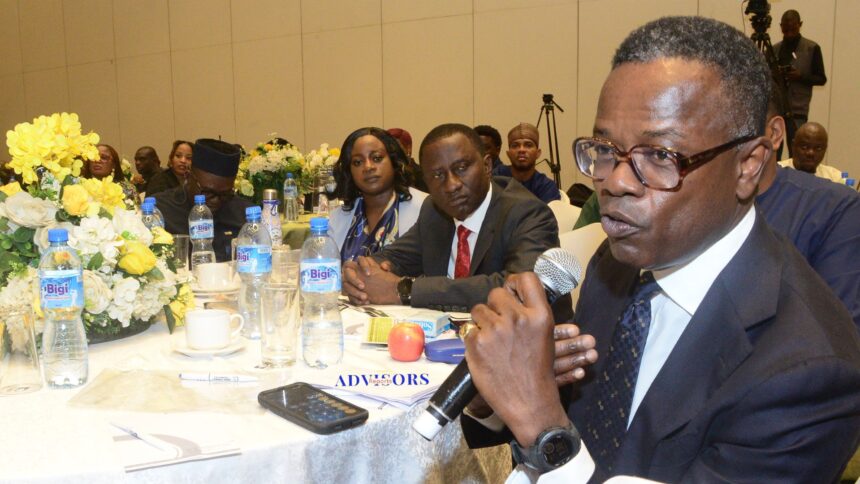… says “when the EV revolution is finally here, Nigeria will still rely on Diesel generators to charge those cars”
Oredola Adeola
Mr. Olumide Adeosun, Managing Director/Chief Executive Officer of Eterna Plc, has acknowledged the inevitability of cleaner energy in Nigeria’s rapidly transforming landscape and urged players in the energy industry to accept the shift driven by technological innovation and changing consumer preferences toward solar, electric vehicles, and Compressed Natural Gas (CNG).
The former Chairman of Major Energy Marketer Association of Nigeria (MEMAN) shared these thoughts during the second panel at the just concluded Annual Energy Conference of the Association of Energy Correspondents of Nigeria (NAEC) in Lagos,
Adeosun has therefore insisted that the country must adopt a bold, forward-looking approach to harness its hydrocarbon resources for a secure and gradual energy transition.
“When the EV revolution is finally here, Nigeria will still rely on diesel generators to charge those cars” this according to him, may be due to the persistent weaknesses in its power sector.
He therefore noted that, “The energy landscape is changing. We have an abundance of solar energy in this country, whether we like it or not.
“Customers are moving because battery technology is getting better, bigger, and cheaper.
“People are now able to store the energy they generate from solar. That’s the new reality,” Adeosun said.
According to him, the move towards renewable energy and electric mobility is accelerating globally and beginning to reflect in Nigeria’s market trends.
“There are now about seven electric vehicle (EV) companies in Nigeria.
“They all come at different price points, but when you compare them with internal combustion engine (ICE) versions, you’ll find that EVs are offering better value,” he explained.
“What that means is that Nigeria may still be living in the present, but for every one EV sold, that’s one Internal Combustion Engine vehicle (ICE) vehicle that we’re not going to sell again.”
The MD of Eterna Plc therefore cautioned against viewing Compressed Natural Gas (CNG) as the only solution to Nigeria’s energy challenges.
He explained that if the government decides to convert all cars in Nigeria to CNG, the country might end up like Cuba, where most vehicles on the road are older models, many vintages American cars, and Soviet era.
“You simply can’t convert 12 million vehicles to CNG,” he stated.
“Yes, Rainoil is doing a great job in pushing CNG adoption, but the focus shouldn’t be limited to that alone.
“We also need to create niche markets in other forms of oil and alternative energy products. The landscape keeps changing.”
Reflecting on his earlier work in the sector, the Eterna boss recalled that the conversation around Nigeria’s refining capacity and local energy security has evolved significantly.
“Eight years ago, I wrote a paper on the Nigerian refining revolution, and at that time, Dangote was already disrupting the entire midstream and downstream sectors — positively, of course.
“Some may argue otherwise, but there’s always a price for taking risks,” he said.
“Many midstream and downstream players must now be in tune with what customers want.”
Adeosun projected that Nigeria’s energy consumers will increasingly adopt electric solutions, even amid persistent infrastructural constraints.
“In the next eight years, many Nigerians will have EV chargers in their homes,” he predicted.
“Of course, the country will find solutions along the way, but unfortunately, because of our power crisis, when the EV revolution fully arrives, Nigeria may still rely on diesel generators to charge those EVs. That’s the irony of our situation.”
He therefore charged investors, and local operators in the midstream and downstream industry to act and operate strategically to protect their businesses and remain competitive.
“A lot of us are already raising funds to position ourselves as active participants, rather than allow interlopers to come in and take over our businesses. This is a critical time,” Adeosun warned.
“We must recognise that an energy mix revolution is happening, and we have the capacity to invest across multiple fronts. Opportunities still abound, but we must approach them with open minds.”
He urged Nigerian energy players to monitor technological trends in other emerging markets.
“In India, two-wheelers are increasingly moving to battery power, while cars are shifting to hybrid systems. We need to keep an eye on those technologies,” he said.
“We must be bold as an industry.”
On infrastructure and logistics, Adeosun emphasised the need for efficient product movement across the country.
“We must transport our oil and gas efficiently. Our roads must be safe and functional, but pipelines remain critical to sustaining and distributing this market,” he added.
“All players must take this seriously — the future of the downstream depends on it.”
Adeosun further called for policies mandating the inclusion of gas reticulation infrastructure and facilities in both new and existing residential estates to create a more structured demand for Liquefied Petroleum Gas (cooking) in household applications.
He emphasised that without developing last-mile demand centers through robust infrastructure that effectively connects markets to consumers, the core objectives of the ongoing campaign for gas penetration may not be achieved in good time.




